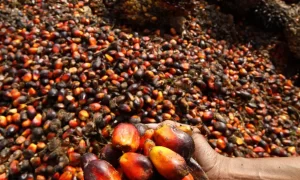Palm ends two-day gains on firmer ringgit

Malaysian palm oil futures fell on Wednesday after two days of gains, pressured by a stronger ringgit that made exports costlier. The January contract slipped 12 ringgit to 4,125 ringgit per tonne. Analysts said the firm currency and weaker crude oil prices weighed on sentiment, despite steady global edible oil demand.
KUALA LUMPUR: Malaysian palm oil futures snapped two consecutive sessions of gains on Wednesday, as a firmer ringgit that made the commodity more expensive for buyers holding foreign currencies weighed on the market.
The benchmark palm oil contract for January delivery on the Bursa Malaysia Derivatives Exchange slid 12 ringgit, or 0.29%, to 4,125 ringgit ($976.56) a metric ton at the close. The contract rose 0.61% in the last two sessions.
The market traded lower with the stronger ringgit weighing on sentiment, said David Ng, a proprietary trader at Kuala Lumpur-based trading firm Iceberg X Sdn Bhd.
The ringgit palm’s currency of trade, strengthened 0.07% against the U.S. dollar to 4.133, as of 1030 GMT, hitting its highest level in a year.
Dalian’s most-active soyoil contract rose 0.44%, while its palm oil contract shed 0.09%. Soyoil prices on the Chicago Board of Trade were down 0.2%.
Palm oil tracks price movements of rival edible oils, as it competes for a share of the global vegetable oils market.
Oil prices fell nearly 1%, weighed down by oversupply in the market, while expectations that an end to the longest-ever U.S. government shutdown could boost oil demand curbed losses.
Weaker crude oil futures make palm a less attractive option for biodiesel feedstock.
Malaysia’s crude palm oil production is expected to surpass 20 million metric tons for the first time in 2025, supported by favourable weather, improved labour supply, and higher-yielding new plantations, trade and industry officials told Reuters.
Indonesia’s biodiesel consumption this year as of November 10 reached 12.25 million kilolitres of fatty acid methyl ester made from palm oil, an energy ministry official said.
Chinese state trader COFCO’s oilseed unit said it had signed agreements to purchase Brazilian soybeans, soybean oil, palm oil and other agricultural products, totalling nearly 20 million tons worth over $10 billion.
To Read more about Edible Oil News continue reading Agriinsite.com
Source : Business Recorder
















